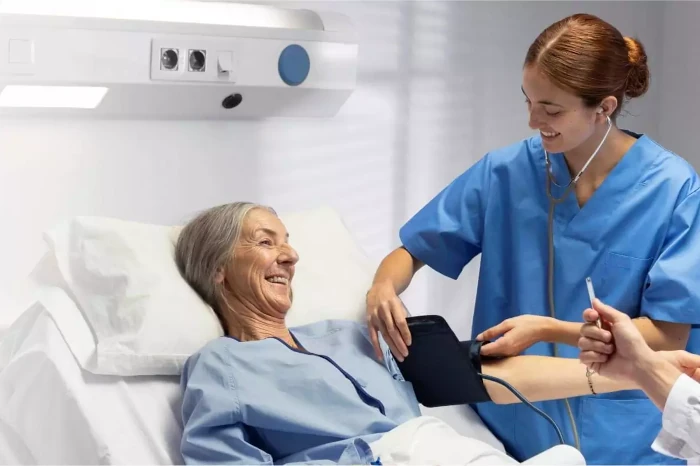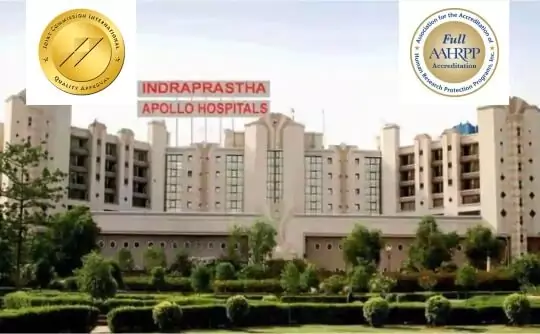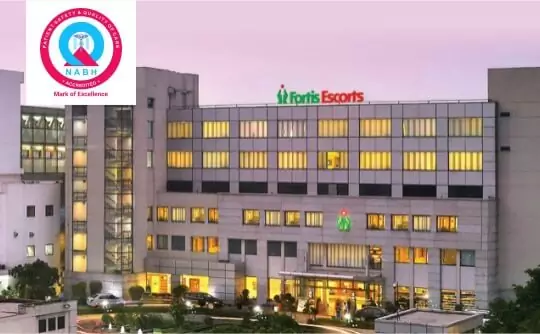

The two main types of valves used for heart valve replacement are tissue valves and mechanical valves. Each type of valve comes with its unique characteristics, advantages, and considerations that influence not only the procedure but also the overall cost of procedure. The choice between these valves depends on several factors, including the patient's age, lifestyle, medical history, and risk factors.
A significant component of a Mitral Valve Replacement Cost in India is the heart surgeon's fees. IndiCure recommends highly experienced, skilled, board-certified heart surgeons who can deliver excellent results. While the charges may vary based on the surgeon's experience, you can be confident that you are in safe and capable hands when opting for affordable heart surgery in India with IndiCure Health Tours.
In the pursuit of enhancing efficiency of surgical procedure and patient care, the medical equipment manufacturers continually introduce new techniques and technologies into surgical procedures. These innovative advancements are designed to improve outcomes, reduce recovery times, and increase the overall effectiveness of the surgical interventions. While these advancements can significantly benefit patient care and efficiency of the procedure, they may also lead to a higher Mitral Valve Replacement cost in India.
Selecting an accredited medical facility with skilled and qualified medical staff is essential for the success of the Mitral Valve Replacement in India. Larger cities in India generally provide superior medical facilities and more experienced heart surgeons, leading to higher costs. IndiCure Health Tours recommends surgical facilities in these larger cities to prioritize quality of care and ensure safety of our overseas patient guests.
The expenses related to mitral valve replacement surgery include the pre- and post-surgical expenses. The pre-surgical expenses depend on age and medical condition of the patient, requiring different number and type of investigations. The post-surgical expenses vary basis include prescription medications and extent of follow-up consultations required.
At IndiCure Health Tours, we consolidate most of the expenses for your Mitral Valve Replacement cost in India to provide you with an inclusive and cost-effective package tailored to your budget and individual requirements. After receiving medical reports, your case manager will provide an estimate on cost based on a discussion with the heart surgeon in India.
The final Mitral Valve Replacement cost in India can however be confirmed after your face-to-face consultation with the heart surgeon in India.

We Help you Choose the Right Treatment, Surgeon & Hospital

We Arrange Video/Telephonic Consultation with the Surgeon

We Assist you with Visa & Accommodation

We Receive you at the Airport and Drop you at Hotel/Hospital

We Assist you the at Hospital & Provide Post Operative Support
IndiCure Health Tours offers exclusive savings on your medical trip to India. We choose to partner with the best hospitals in India to negotiate special rates. This ensures that you not only get the best quality healthcare, but also the most affordable prices when you travel for surgery with us.

Here is a set of questions you should consider asking before commencing your medical journey for Mitral Valve Replacement in India.
Prepare to answer questions about your:
Mitral valve replacement is a surgery in which a patient's heart's diseased mitral valve is replaced with a mechanical or tissue (bioprosthetic) valve.
The most common reasons for the change of Mitral valve are:
Mitral valve regurgitation- Mitral valve regurgitation is a condition in which the heart's mitral valve doesn't close tightly, which allows blood to flow backward in the heart.
Mitral valve stenosis- It is a medical condition in which the mitral valve flaps thicken and stiffen, and they may fuse. As a result, the valve aperture narrows and blood flow from the left atrium to the left ventricle is restricted.
Symptoms of mitral valve disease may not appear for several years in some patients. The following are some of the signs and symptoms of mitral valve disease:
There can be several reasons for mitral valve disease, some of which may include birth defects, infection, calcification, and inherited collagen disease.
Even if you don't have symptoms, your doctor may recommend mitral valve surgery or replacement to avoid complications and improve outcomes. If you need surgery for another heart problem, your doctor may decide to repair or replace the defective mitral valve as well.
Current mitral valve replacement approaches include open heart surgery and minimally invasive cardiac surgery (MICS).
There are two main types of artificial mitral valve:
Advantages of mitral valve repair over replacement include lower surgical mortality, lower rates of stroke and endocarditis (an infection of the heart's inner lining), equivalent or better long‑term durability, and improved long-term survival.
Whenever possible, mitral valve repair is advised since it preserves your heart valve. Surgical repair of a mitral valve may include patching holes in the valve, reconnecting valve flaps (leaflets), separating fused valve leaflets, replacing the valve's support cords, or removing extra valve tissue so that the leaflets can close firmly. Surgeons frequently use an artificial ring to tighten or reinforce the ring around a valve (annulus).
Surgeons may replace your mitral valve if it cannot be repaired. Your surgeon will remove the damaged valve and replace it with a mechanical valve or a valve manufactured from cow or pig heart tissue during mitral valve replacement (biological tissue valve).
Biological tissue valves deteriorate over time and will need to be replaced. A catheter operation can be used to put a new valve in a biological tissue replacement valve that has failed. To avoid blood clots, people with mechanical valves will need to take blood-thinning drugs for the rest of their lives.
Valve repair/ replacement surgery is done under general anesthesia and takes about four to five hours. There are different approaches to valve repair/replacement surgery. These are:
Open Heart Surgery: This involves a cut in the chest to access the heart.
Minimally Invasive Heart Surgery: Smaller incisions in the chest are used in this procedure. Compared to open-heart surgery, minimally invasive heart surgery results in a shorter hospital stay, faster recovery, and less pain.
Robot-assisted Heart Surgery: A sort of minimally invasive surgery in which the surgeon observes the heart on a video monitor from a remote location. Robotic arms are utilized by the surgeon to conduct the same maneuvers as open-heart operations. As a surgery alternative, robotic mitral valve replacement is becoming more popular.
Transcatheter procedure: A cardiologist performs the transcatheter operation in the catheterization lab. A catheter is inserted into a vein and guided to the heart in this type of treatment. The catheter could be used to send tools to the valve to repair or replace it.
After the incision and separation of the breastbone and ribs, the surgeon opens the heart and traces the faulty valve.
The edges around the valve are slightly sliced to help loosen it from the tendons that connect it to the rest of the heart and then the valve can be removed.
The new valve is then inserted and attached into place. After the surgery is done, the patient is taken off the bypass machine and the chest is closed.
You'll typically spend a day or more in the intensive care unit (ICU) after having mitral valve repair or replacement surgery. You'll be shifted to a regular hospital room for a few days after leaving the ICU. Depending on your condition and the type of surgery you have, the amount of time you stay in the ICU and hospital can vary.
You will need to stay in the hospital at least overnight after a transcatheter procedure, although you may not need to stay in the ICU. There are no tubes needed to drain fluid or blood from your chest with this method.
Your doctors and nurses will keep an eye on your progress. Your blood pressure, respiration, and heart rate will be monitored often. Your doctor will also work with you to manage any post-surgery pain.
As you heal, you'll be told to gradually increase your activities and undertake breathing exercises. During your stay in the hospital, your nurses will assist you in taking longer and longer walks. You will be able to resume your routine work and activities in about 4 weeks, but rigorous work will have to wait for 8-10 weeks and can be undertaken after the surgeon's advice.
Mitral valve repair and replacement surgery can help you live a better life by reducing symptoms and improving your quality of life.
You'll need to see your doctor on a frequent basis to ensure that the new or repaired valve is functioning properly.
To avoid blood clots, you'll need to take blood thinners for the rest of your life if your mitral valve is replaced with a mechanical valve. Biological tissue valves degenerate (break down) over time and must be replaced.
Cardiac rehabilitation, a program of education and exercise designed to help you improve your health and recuperate after heart surgery, may also be recommended by your doctor. Before and after mitral valve surgery, maintaining a healthy lifestyle is critical to your heart's health. A healthy way of life involves the following:

New Delhi
Indraprastha Apollo Hospitals, New Delhi is a state of the art multi speciality tertiary-care hospital situated in the most posh area of South Delhi. Considered to be the flagship hospital of Apollo group, Indraprastha Apollo Hospital is one of the important landmarks not only in Delhi, but in the world map because of its popularity among the medical tourists. The hospital has been one of the most sought after medical institutions for patients from Asia Pacific and beyond.

New Delhi
Fortis Escorts Heart Institute and Research Centre is one of the most revered medical institutions not only in India, but the entire world. The institute has set benchmarks in cardiac care with path-breaking work over the last 25 plus years. The hospital has the most advanced technology and has seen the best outcomes even in the most complex cardiac cases; be it cardiac surgery, Interventional Cardiology, Pediatric Cardiology, Pediatric Cardiac Surgery or Non-invasive Cardiology
At 5 years, the survival of patients who underwent mitral valve repair was 82%, and those who underwent valve replacement were 72%.
Source: https://www.ahajournals.org/doi/full/10.1161/01.CIR.0000079169.15862.13
Your heart function and life will most likely return to normal after you have an artificial valve implanted. If you had symptoms prior to surgery, you should feel far better now than you did before. Shortness of breath and weariness, for example, should no longer be an issue.
Researchers revealed that five years after being diagnosed with a minor valve leak, lots of patients were still alive. Those who have a serious leak that goes untreated, on the other hand, have a far lower chance of living, with just about 60% surviving after five years. As a result, the severity of a valve leak is important to determine how long one can survive with a bad valve.
You can check the list of best heart surgeons in India
With the advancement in technology and the experience of cardiac surgeons, mitral valve replacement is a fairly safe procedure. The surgical risk for asymptomatic patients having mitral valve surgery is about 1 in 1000. In symptomatic patients, the risk is still far below 1%. Your particular risk is influenced by the presence of coronary artery disease or other illnesses that necessitate surgical treatment.
Though few and far, the risks of an open mitral valve replacement are as follows:
Technically speaking, heart valve repair is better than replacement, and cardiac surgeons do advise valve repair as far as possible. However not everyone can be a candidate for valve repair. Valves that cannot be repaired have to be replaced with a mechanical or tissue valve. Replacing it may cause your heart function to deteriorate. A repair not only allows you to preserve your valve, but it also increases survival chances and reduces the danger of bleeding.
Mitral valve repair surgery has a success rate of around 95% with adequate patient selection and timely intervention. Nearly 95 percent of patients are free of reoperation for 10 years after the surgery. Around 90% of persons do not require reoperation for mitral valve replacement after 20 years.
To arrive at a comprehensive budget for availing Mitral Valve Replacement in India, there are several expenses other than mitral valve replacement cost in India that you should plan for when organizing your medical trip to India. These include:
The cost of flight tickets from your place to the city where you are getting the Mitral Valve Replacement done in India, which may vary depending on your departure location and the time of booking.
The cost of daily meals before and after the hospital stay.
The cost you will incur for taxi fares, ride-sharing services, or rental cars to shuttle between hotel and hospital.
The cost of lodging before you get admitted to hospital and after you discharge form hospital.
By adding these additional expenses to the cost of Mitral Valve Replacement in India, you can create a comprehensive overall budget to ensure a smooth, hassle free and comfortable recovery experience.
Enhance your medical journey to India by availing these extra services.
Traveling abroad for medical reasons may be challenging. With our experience of over a decade and working with the best surgeons and top hospitals in India, we help make your medical tour easier and safer for you. We will guide you at every step of the way and make end-to-end arrangements for your surgery, travel, and stay.
Ramandeep Dhaliwal
I had great experience having rhinoplasty through Indicure. Dr. Ruchika from Indicure has helped me in finding best plastic surgeon, answering all my questions...
Read More
Joshua Archer
My name is Joshua Archer I'm from New Zealand, bay of plenty, kawerau I opted for the bypass surgery in January 2023 but planned it in advance for 28 September found IndiCure...
Read More
Kera Ren
Absolutely loved my experience with IndiCure - from first inquiring to meeting the surgeon pre op to my follow up post op. The surgeon was extremely approachable...
Read More
Andreana Paul
Had a wonderful experience. Visited India for my plastic surgery. From sending mails, airport pickup, comfortable accommodation and, to smooth hospital appointment booking...
Read More
Brandi Luce
I had the privilege of using Indicure's services for a cosmetic procedure that I had wanted for a long time but had always been apprehensive about. Ruchika helped me...
Read More
Jade M
Indicure Health Tours went above and beyond my expectations. They helped me with every aspect of my journey and were professional, kind and caring. I was...
Read More
The content on the website (www.indicure.com) is intended to be general information and is provided only as a service. All photographs on our website of before and after results are examples only, and do not constitute an implied or any other kind of certainty for the result of surgery.
Learn about IndiCure Health Tours' comprehensive editorial policy that strives to deliver trustworthy, helpful, relevant, accurate and people-first content on medical tourism in India.
It is not medical advice and should not be taken as medical advice. It should not be used to diagnose or treat a health condition and is in no way meant to be a substitute for professional medical care. You are advised to see a surgeon in person to assess what surgery may or may not accomplish for you.
It is also important to keep your expectations realistic and to understand that all surgical procedures carry risks and should never be taken lightly.